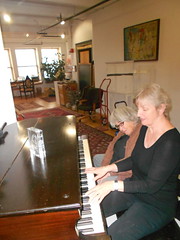Feminst icon Kate Millett, a long time Bowery resident and author of “Sexual Politics,” a seminal book on oppressive gender roles in literature, received word yesterday afternoon that she and eight other American women, including House Democratic Leader Nancy Pelosi and the late Republican First Lady Betty Ford, have been named as inductees into the National Women’s Hall of Fame in Seneca, N.Y., site of the first women’s rights convention in 1848.
“It’s a great honor — overwhelming and very humbling,” Ms. Millett, 78, told The Local in a phone conversation from her loft on East Fourth Street, about an hour after she received an e-mail announcing her as one of nine inductees.
The National Women’s Hall of Fame is a non-profit membership organization that has been recognizing the achievements of prominent women in the United States every other year since 1969. The group’s announcement of its 2013 inductees was timed to coincide with the advent of Women’s History Month in March.
Ms. Millett, described variously in a prepared statement as a feminist activist, visual artist, filmmaker, teacher and advocate for human rights, will be officially inducted during a formal ceremony in Seneca Falls on Oct. 12, joining 247 other American women who have been honored by the group over the years for “enduring contributions to the nation” in the arts, science, business, sports, government and philanthropy. Past inductees include early women’s rights advocate Elizabeth Cady Stanton, tennis legend Billy Jo King, astronaut Sally Ride, Senator Barbara Mikulski, Democrat of Maryland, and comedienne Lucille Ball.
“It’s a spectrum from radicalism to establishment and we’re all honored and I think it’s wonderful,” said Ms. Millett.
Beverly P. Ryder, co-president of the Women’s Hall of Fame board of directors, said the inductees were chosen from about 100 nominees and selected by an independent national panel of judges, among them academics and members of women’s and student organizations.
Ms. Ryder, a retired corporate executive from Los Angeles, characterized Ms. Millett as a “real pillar of the women’s movement. She’s considered one of the great women of the 20th century.”
Jacqui Ceballos, former president of the New York City Chapter of the National Organization for Women, recalled Ms. Millett as a radical feminist who belonged to several groups and also joined in NOW in 1967 even though that group was considered conservative at the time. “Kate was always yelling from the floor that we must do this and that and we supported her. The officers in NOW told Betty [Friedan] that we were wild. Our group would hang out at Kate’s loft in the Bowery, typing her booklet, ‘Token Learning,’ about how the declared aim of women’s colleges aim was to prepare women for their roles as wives and mothers. She led the demonstration against The New York Times — and she really cracked the whip. She also was active at Columbia and Barnard helping to start their feminists organizations.”
Ms. Millett, shown in her younger days with Ms. Ceballos in a recent three-hour documentary on PBS on women’s history called “Makers,” said feminism has come a long way since her early involvement. “And we obviously have further to go,” she added. “We still earn a quarter of a dollar to every man’s dollar.” As for women’s reproductive rights and a new law in Arkansas severely restricting abortion to pregnant women at 12 weeks, she said, “It’s terrible but it’s bound to challenged.”
As for future projects, Ms. Millett said she hopes to publish a book on the history of her mother and her mother’s sisters, who were Irish immigrants. “It’s my family story,” she said. “My mother was also a feminist and Catholic” who, she said, sold life insurance in her native St. Paul, Minn. “She was a pioneer in life insurance in a big organization and she went right to the top of her profession. She taught me and my [two] sisters to be somebody. She really didn’t think gender was a hindrance and neither did my father.”
With that kind of background, Ms. Millett acknowledged with a chuckle, “I did have confidence.”





